Custom Cell-Based Assay Development
Cells can be engineered to serve as readouts for cell-based assays as an alternative or complement to biochemical assays. A variety of cell-based assay types can be developed for research and development applications, including pathway analysis, inhibitor/activator studies, CAR-T cell functional screening, ADCC assays, high-throughput screening systems and much more. Our expert scientists will help you optimize your time and efforts by providing effective cell-based assays customized for your research goals. Our expertise in cell engineering reporter assay systems, CRISPR, and lentiviral transduction provide excellent custom resources to meet your desired specifications.
We also offer CRISPR/Cas9 technology to express a protein of interest within the AAVS1 safe-harbor site of chromosome 19. This avoids the adverse effects resulting from random integrations into the cellular genome, eliminating off-target effects.
Our Deliverables to You
- Stable cell lines, lentiviruses, or kits for your custom cell-based assays
- 30+ parental cell lines to choose from or use your own for engineering
- Products that meet your specifications, i.e., expression levels, functional activity, robust outputs, etc.
- Direct, consistent communication with experienced development scientists.
- We can also run screens for you using your custom-developed assay
Cells can be engineered to serve as readouts for cell-based assays as an alternative or complement to biochemical assays. A variety of cell-based assay types can be developed for research and development applications, including pathway analysis, inhibitor/activator studies, CAR-T cell functional screening, ADCC assays, high-throughput screening systems and much more. Our expert scientists will help you optimize your time and efforts by providing effective cell-based assays customized for your research goals. Our expertise in cell engineering reporter assay systems, CRISPR, and lentiviral transduction provide excellent custom resources to meet your desired specifications.
We also offer CRISPR/Cas9 technology to express a protein of interest within the AAVS1 safe-harbor site of chromosome 19. This avoids the adverse effects resulting from random integrations into the cellular genome, eliminating off-target effects.
Our Deliverables to You
- Stable cell lines, lentiviruses, or kits for your custom cell-based assays
- 30+ parental cell lines to choose from or use your own for engineering
- Products that meet your specifications, i.e., expression levels, functional activity, robust outputs, etc.
- Direct, consistent communication with experienced development scientists.
- We can also run screens for you using your custom-developed assay
Cell Line Formats
Reporter
- High throughput screening tool to identify receptor/pathway inhibitors
- 25+ available promoters and 30+ parental cell lines
- Customize with your cell line and gene promoter of interest
- Luciferase, eGFP, or custom reporter systems
Co-Stimulatory
- For use in co-culture with reporter cells
- High throughput inhibitor screening
- TCR activator + customized expression of co-stimulators or checkpoint inhibitors
CAR-T Cell Killing
- Expression of your CAR on immune-derived primary cells or cell lines to model CAR-T function in co-culture studies
- Target cells with target antigen overexpression or knockout as a negative control
Phosphodiesterase Activity
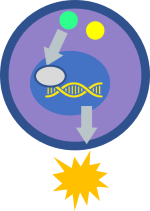
- For screening inhibitors of specific PDE enzymes
- Robust luciferase readout based on cAMP or cGMP-driven CRE promoter activation
ADCC Effector
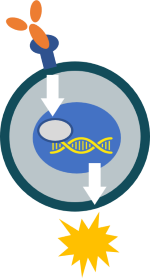
- To identify antibody engagement and activation of Fc Receptors
- Identify inhibitors of antibody-Fc activation
- Luciferase or other reporter under the control of NFAT response elements
Activation/Proliferation
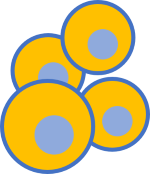
- Can be engineered for protein overexpression or KO
- To screen for activators or inhibitors of cell growth and cell activation
These are just a few examples of our capabilities. We can develop custom cell-based assays that enable discovery across a number of research areas, including infectious disease, immunotherapy, cell & gene therapy, iPSCs, metabolic pathways, epigenetics and more.
Available Promoters
We can design custom cell reporter systems to meet your requirements. Select a promoter from our current offerings below or use your desired promoter. We will construct a plasmid with a reporter such as luciferase, eGFP, or other protein/enzyme to engineer responsive target cells customized for your research.
AP-1, ARE, CRE/CREB, FOXO, Foxp3, GAL4, GAS, Gli, IL-2, IL-8, ISRE, Myc, NFAT, NF-κB, Notch1/CSL, PAI-1, SRE, STAT3, STAT5, TCF/LEF, TEAD, TGF/SMAD, RARα, RARβ, RARγ
Validation Data Examples
ARE Reporter
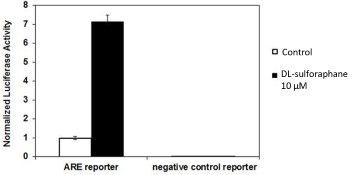
DL-Sulforaphane, an antioxidant inducer, induces the expression of ARE luciferase reporter in HepG2 cells. The results are shown as normalized ARE luciferase reporter activity.
Blocking Antibody/Reporter Cells
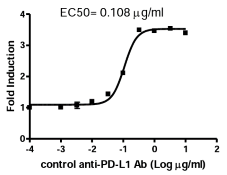
Dose response curve of anti-PD-L1 neutralizing antibody in PD-1:PD-L1 cell-based assay. HEK293 cells were transiently transfected with human PD-L1 and an engineered T cell receptor (TCR) activator. The next day, transfected HEK293 cells were pre-incubated with anti-PD-L1 neutralizing antibody (Cat. #71213) for 30 minutes prior to co-culture with growth-arrested PD-1/NFAT reporter cells. After 16 hours of stimulation, ONE-Step™ Luciferase reagent was added to cells to measure NFAT-induced luciferase activity.
Quote Request
Inquiries
│Related Services
│Related Products
- Cell Lines & Primary Cells
- Cell Media & Luciferase Reagents
- Cell-Based Assay Kits
- Cell Isolation Kits

